Overview
In healthcare, the emotional challenges faced by providers can be overwhelming. The administrative burdens they carry often distract from what truly matters: patient care. Medical transcription plays a crucial role in alleviating these burdens, allowing providers to focus more on their patients while ensuring that medical documentation is both accurate and comprehensive.
Advancements in AI-driven transcription services serve as a beacon of hope, enhancing efficiency and accuracy. Imagine how much more time healthcare professionals could dedicate to direct patient interactions! This not only improves patient outcomes but also fosters better communication and trust between providers and patients.
As we navigate these changes, it's essential to recognize the positive impact of streamlined processes. By embracing these innovative solutions, healthcare providers can reclaim valuable time, ultimately enriching the care they deliver. How can we support you in this journey towards improved patient engagement and care?
Introduction
In the intricate world of healthcare, we understand that the challenges can feel overwhelming. The importance of precise documentation is critical, as medical transcription acts as a vital link between healthcare providers and accurate patient records. It ensures that every detail is captured and communicated effectively, alleviating some of the stress that comes with managing patient care.
As the industry evolves, the integration of advanced technologies, particularly artificial intelligence, is transforming the transcription landscape. This transformation enhances both speed and accuracy, allowing healthcare professionals to focus more on what truly matters—their patients. Imagine a scenario where administrative burdens are lifted, empowering you to prioritize patient care and ultimately leading to improved health outcomes.
With the stakes higher than ever, it is crucial to recognize the essential role of medical transcription in the healthcare ecosystem. By embracing these advancements, we can navigate the complexities of modern medical practice together. How can we further support you in this journey? Your insights and experiences are invaluable as we strive to enhance the quality of care for everyone.
The Essential Role of Medical Transcription in Healthcare
Medical documentation is vital to the integrity of medical records, serving as the backbone for transforming voice recordings from providers into accurate written reports. This process is crucial for maintaining comprehensive health records, which professionals rely on to assess individual well-being, formulate treatment strategies, and comply with regulatory requirements. As we approach 2025, the significance of medical transcription cannot be overstated; errors in records can have serious consequences, including jeopardized patient safety and diminished care quality.
Have you ever considered how administrative burdens can impact patient care? Recent statistics reveal that , like those offered by CosmaNeura, save an average of 2.5 hours per day. This efficiency not only streamlines workflows but also enhances record accuracy, which is essential for effective communication among providers. By leveraging AI-driven solutions, including automated appointment scheduling and health record management, improved documentation fosters collaborative care efforts, ensuring that all members of a healthcare team are aligned in their approach to treatment.
Case studies illustrate the significant effect of health documentation on patient safety. For instance, CosmaNeura has shown that many writing errors stem from procedural issues rather than the service itself. By promoting high accuracy rates and flexible service options, the company counters the misconception that healthcare documentation is a declining field.
Their commitment to quality and security, underscored by HIPAA and HITECH compliance, positions them as a reliable partner in the healthcare documentation landscape. Furthermore, the efficiency of services is highlighted by Ditto's ability to deliver STAT files in four hours or less, underscoring the importance of medical transcription for timely documentation in the medical field.
As the wellness sector evolves, the role of healthcare documentation remains essential. With technological advancements, including AI-driven solutions, the precision of health documentation is improving significantly. These innovations not only enhance the reliability of client records but also lead to better health outcomes by allowing providers to focus more on care rather than administrative tasks.
In this context, the importance of medical transcription in health documentation is paramount, ensuring that safety and quality of care are upheld in every interaction. Dr. Steven B., a neurosurgeon and Ditto client, shared, "Getting in contact with the account manager in the hospital would take hours and sometimes days. I never had a problem getting in contact with Ditto. They understood how time-sensitive and crucial my dictations are." This perspective emphasizes the essential role of prompt documentation services in the medical environment.
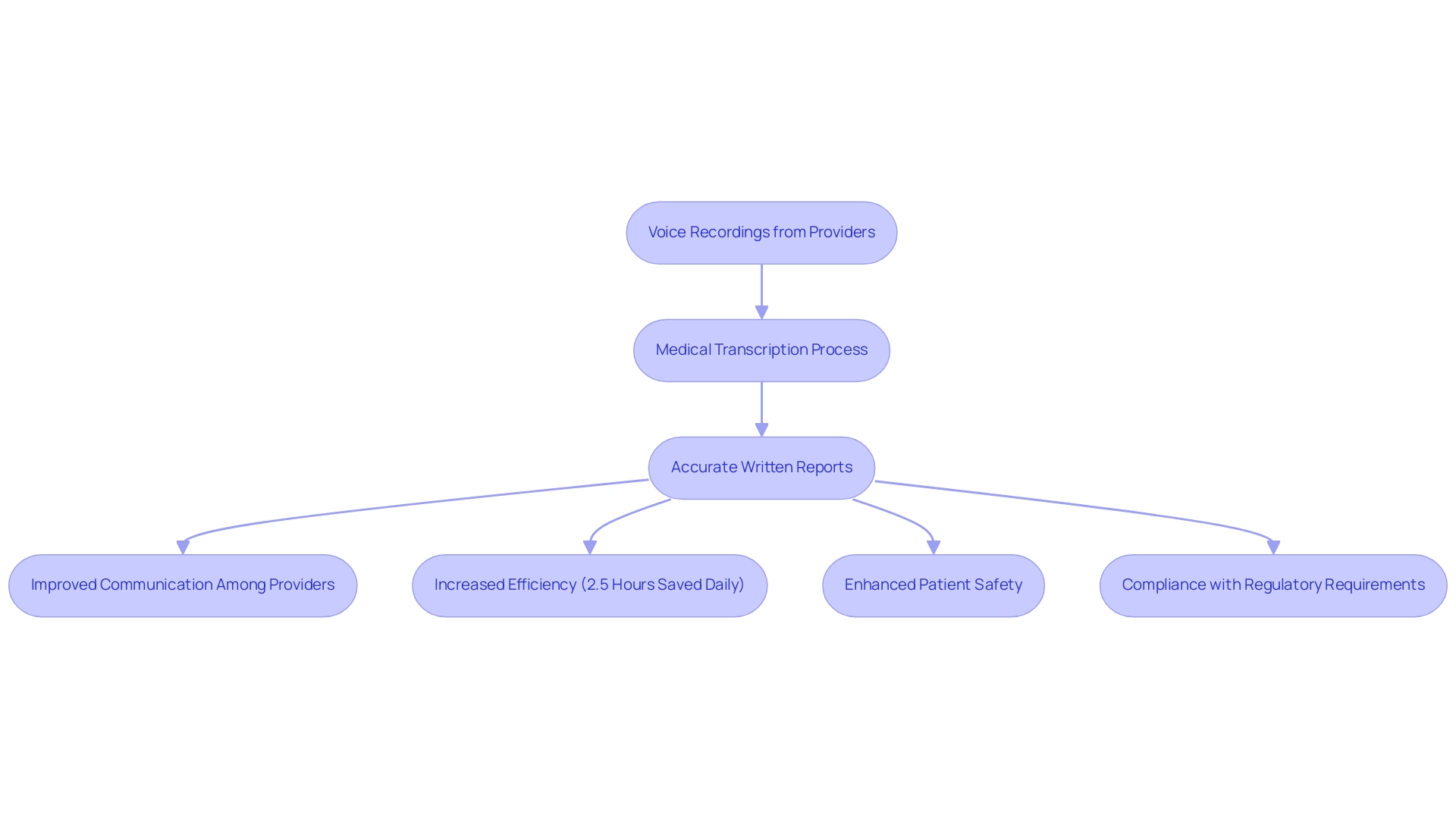
Enhancing Patient Care Through Accurate Medical Transcription
The the vital role of medical transcription, designed as a structured series of steps to ensure precision and efficiency in recording individual information. This ultimately improves care by allowing providers to focus on what truly matters—their clients. The process typically includes several key stages:
- Dictation: Healthcare providers begin by dictating notes into a recording device or digital dictation system, capturing essential details about interactions. This step frees them from cumbersome paperwork, allowing them to concentrate on patient care.
- Transcription: A transcriptionist listens to the recorded dictation and meticulously transcribes it into written text. This conversion of spoken language into formal documentation can be further streamlined with AI solutions.
- Editing: The transcribed document undergoes a thorough review for accuracy. This crucial step ensures that healthcare terminology, grammar, and punctuation are correct, maintaining the integrity of patient records.
- Quality Assurance: To enhance accuracy further, a second reviewer may check the final document against the original dictation. This additional layer of scrutiny helps meet stringent quality standards in healthcare documentation.
- Finalization: Once approved, the completed report is formatted appropriately and stored electronically within the facility's record-keeping system. This ensures easy accessibility for future reference, facilitating continuity of care.
In 2025, the average duration for medical documentation in clinical environments has significantly improved. The interface application procedure for converting dictated segments to Clinical Note sections now takes under 10 seconds when there are no mistakes. This efficiency is bolstered by advancements in technology, including AI-driven speech recognition tools that have demonstrated a high accuracy rate of 98.6%, making them reliable options for healthcare providers.
A case study at the Mayo Clinic emphasized the effectiveness of speech recognition technology as a writing aid compared to traditional methods. This study revealed that integrating clinical systems with biostatistics not only improved the speed of documentation but also enhanced overall accuracy, showcasing the potential benefits of adopting innovative documentation solutions in clinical settings.
Outsourcing documentation services further underscores the importance of medical transcription. This allows medical professionals to focus on their primary skills while enhancing efficiency and patient outcomes. For instance, by automating appointment scheduling and billing procedures along with record-keeping, medical providers can simplify their overall administrative workload. As Chance Myers, Vice President of Customer Solutions, states, "The process of converting audio recordings of professionals in the health sector into written documents is essential, thus improving overall administrative efficiency."
By understanding and implementing these steps effectively, medical professionals can streamline their documentation processes through AI, preserving the human touch in interactions. This enables them to dedicate more time to care and less to administrative tasks. How might these improvements in transcription processes allow you to better serve your patients?
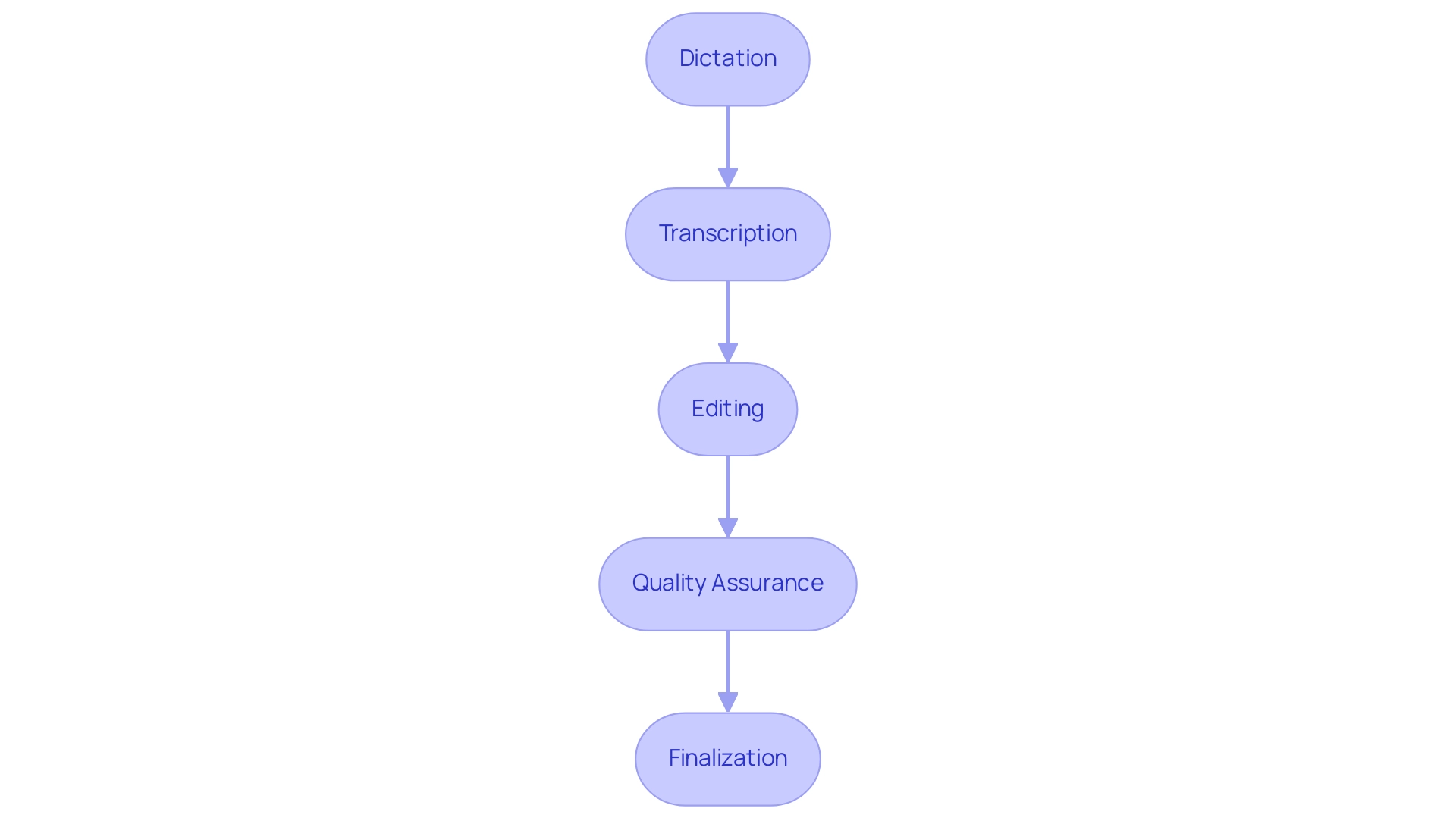
The Evolution of Medical Transcription: Embracing AI and Technology
Precise medical documentation is vital for enhancing the quality of care individuals receive, especially in environments where providers may hesitate to adapt due to concerns about maintaining care standards. When executed correctly, the significance of medical transcription becomes clear, as it equips healthcare providers with accurate and comprehensive records essential for informed clinical decision-making. This accuracy significantly mitigates the risk of misdiagnosis, ensuring individuals receive appropriate treatments grounded in reliable information.
Moreover, timely and accurate documentation paves the way for seamless transitions of care, particularly during referrals or admissions, ultimately enriching the patient experience.
Patients benefit from knowing that their health history is meticulously recorded, fostering improved communication and trust with their providers. Studies underscore the importance of medical transcription, revealing that precise documentation can lead to better clinical outcomes, as healthcare professionals are empowered to make decisions based on complete and error-free records. For instance, a case study titled "The Importance of Quality Assurance in Medical Documentation" illustrates that advanced systems with automated error detection not only enhance accuracy but also diminish documentation errors, thereby improving patient care.
This is particularly relevant as CosmaNeura during scribing, showcasing the efficiency gained through precise recording.
However, medical startups like CosmaNeura encounter substantial challenges in overcoming the deep-seated resistance to innovation within the sector. As we approach 2025, the significance of medical transcription is emphasized by expert insights, including that of Evgeni Kontrient, MD, who highlights the critical link between transcription precision and clinical decisions. By ensuring health records are accurate, providers can make more informed choices, leading to improved health outcomes for individuals.
This commitment to accuracy not only streamlines workflows but also reinforces the human aspect of medical care, allowing providers to dedicate more time to patient interactions rather than administrative tasks. It is essential to recognize, however, that some studies have limitations, such as small sample sizes and missing data on physician sex and specialty, which may influence the generalizability of the findings.
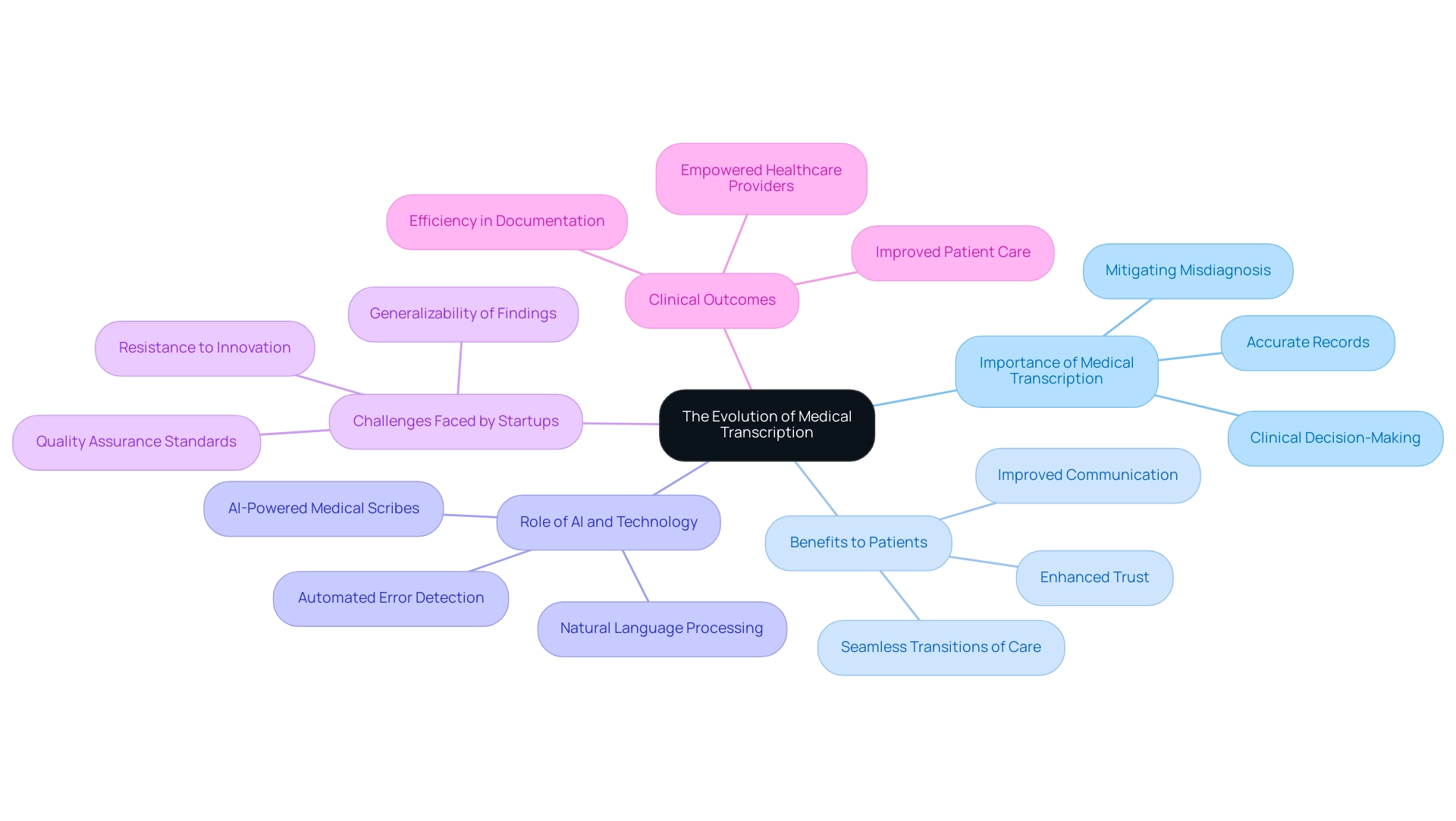
Overcoming Challenges in Medical Transcription for Healthcare Providers
As the healthcare landscape continues to evolve, many healthcare providers face emotional challenges, particularly with the increasing demands of medical documentation. The integration of artificial intelligence (AI) is transforming this field, promising to alleviate some of these burdens. By 2025, AI is set to automate numerous documentation processes, enhancing both speed and accuracy. AI-driven transcription services, such as those offered by CosmaNeura, can swiftly process audio recordings, suggest corrections, and learn from past errors, leading to continuous improvement in output quality.
This technological progress can significantly reduce administrative challenges, allowing medical providers to reclaim precious time to focus on client interactions and high-quality care. By streamlining processes like appointment scheduling, record management, and billing, and . This ultimately leads to improved patient outcomes. Current statistics reveal that 50% of healthcare professionals in the EU express confidence that AI will enhance treatment quality, reflecting a growing acceptance of AI's role in healthcare.
However, skepticism remains. Only 13% of individuals believe that AI will enhance the patient-provider relationship, underscoring the importance of preserving the human touch in healthcare interactions. Notably, only 9% of to patients, suggesting a recognition of AI's potential emotional capabilities, even as nuanced understanding of patient needs remains irreplaceable. Case studies indicate that North America leads the AI sector with a 59.1% share, showcasing the region's proactive approach to integrating AI into clinical documentation.
Still, concerns about racial and ethnic bias in healthcare highlight the need for careful consideration in AI adoption. Clinicians worldwide expect that AI will play a crucial role in decision-making processes over the next decade, reinforcing the technology's potential influence on the future of healthcare documentation. As we look forward, the future of medical documentation technology in 2025 will likely witness further advancements in AI capabilities, including enhanced precision in documentation services.
Cosmonaut's intelligent recording services and smart summarization tools are already demonstrating effectiveness in reducing errors and streamlining workflows. This ultimately enhances the quality of patient care. By harnessing these innovations, medical providers can ensure they remain focused on delivering compassionate care while acknowledging the importance of medical transcription and benefiting from the efficiencies that AI brings to the transcription process. As Chris Harrop, Managing Editor of MGMA Connection, observes, the integration of AI in the medical field must be approached with a balance of technological advancement and the preservation of human interaction.
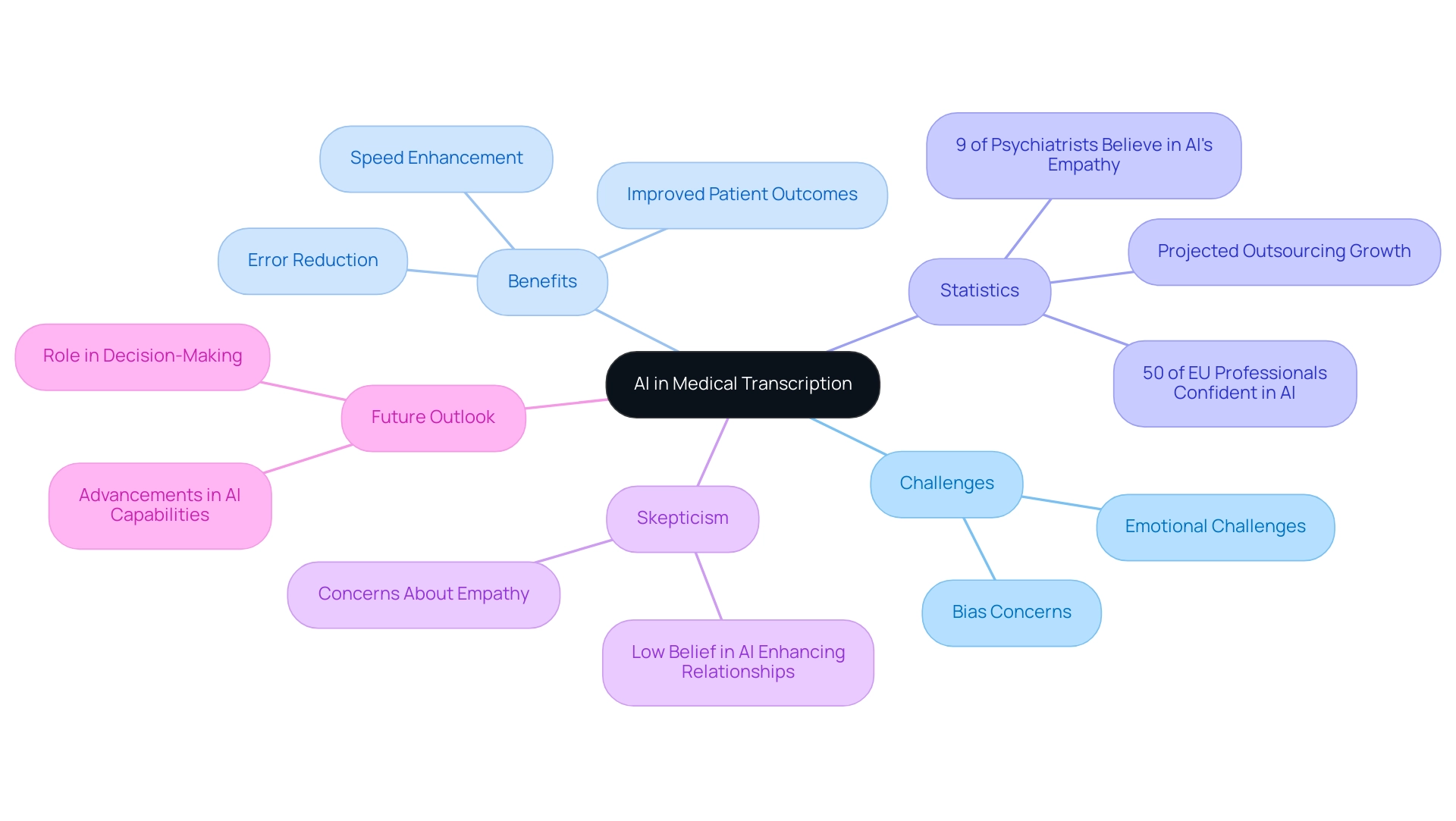
Future Trends in Medical Transcription: Skills and Innovations for Healthcare Providers
Healthcare providers often find themselves overwhelmed by a multitude of administrative tasks, which can detract from their primary focus: patient care. In 2025, as the landscape of medical administration continues to evolve, more than half of executives are prioritizing improvements in efficiency and productivity to reduce operational costs. This shift underscores the vital role of effective documentation services, , which allows providers to outsource these tasks to specialized services.
This strategic approach not only saves precious time but also alleviates stress and minimizes the risk of errors associated with manual documentation. By embracing advanced transcription technologies, medical practices can ensure that documentation is completed swiftly and accurately, enabling timely access to crucial patient information. This efficiency translates into more time spent with individuals, fostering higher satisfaction rates and improving health outcomes.
For instance, case studies reveal that healthcare organizations focusing on operational efficiency through automation technologies have successfully reduced administrative burdens, ultimately benefiting both providers and patients. The case study titled "Operational Efficiency in Healthcare Organizations" illustrates how prioritizing efficiency and leveraging technology can lead to significant enhancements in service delivery.
In 2025, statistics show that 30% of health system executives are prioritizing investments in technology platforms for digital tools and services. This trend highlights the growing recognition of medical transcription as an efficient documentation service. Furthermore, expert insights suggest that by overcoming administrative burdens, medical providers can enhance their workflow, allowing them to devote more attention to patient interactions. As revealed in Deloitte's 2024 US Health Care Consumer Survey, 64% of consumers find virtual visits to be more convenient, emphasizing the broader context of efficiency in medical services and its connection to the importance of documentation services.
Moreover, the envisioned AI 'helper app' exemplifies ongoing technological advancements that assist providers in managing administrative tasks. As medical services continue to adapt to the demands of contemporary practice, the significance of medical transcription emerges as a crucial strategy for improving provider workload while ensuring that the human element in care remains intact. By embracing these innovative solutions, healthcare professionals can navigate the complexities of administrative tasks, all while maintaining a steadfast focus on delivering exceptional patient care.
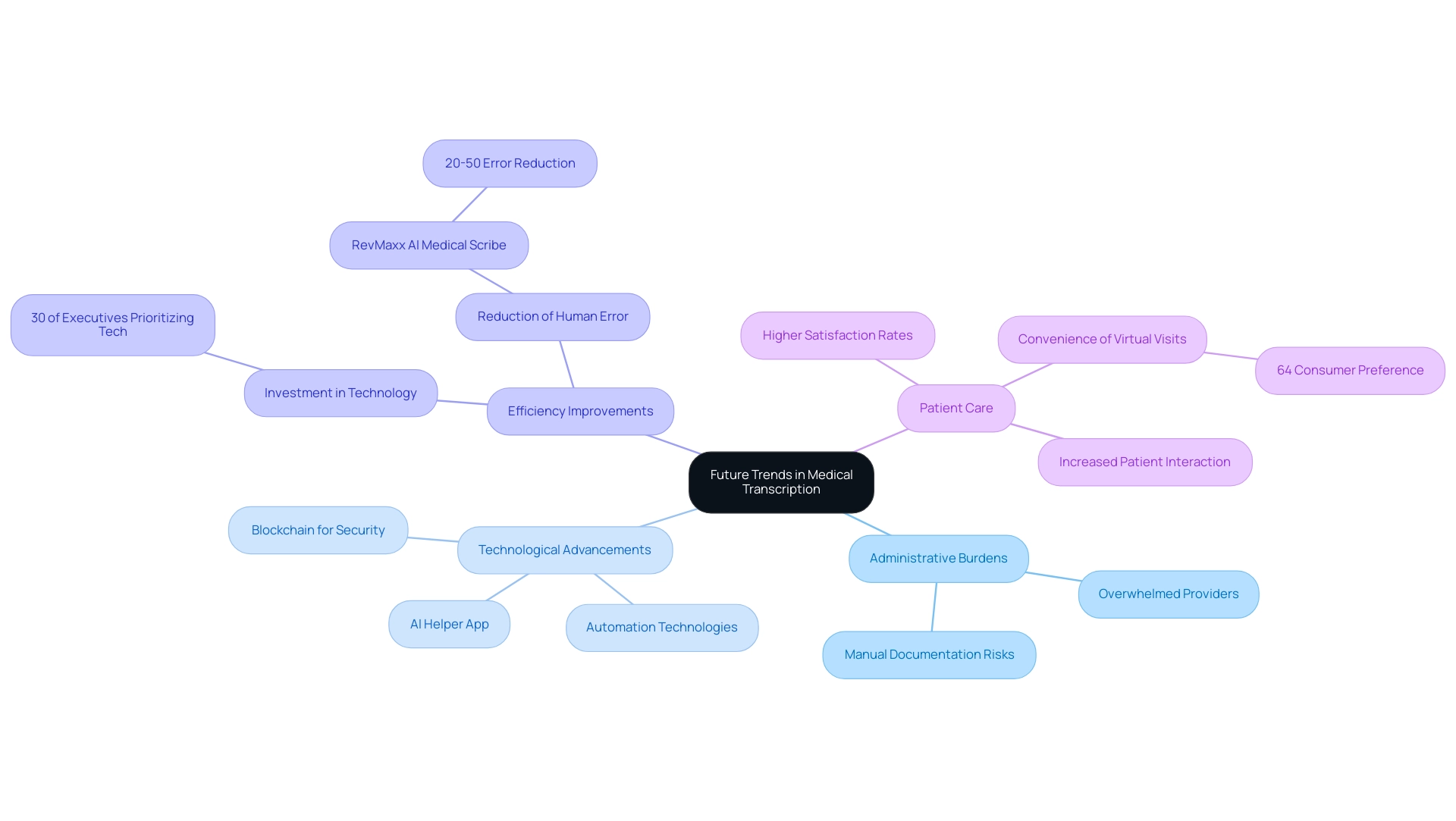
Conclusion
The significance of medical transcription in healthcare is truly profound. It acts as the backbone of accurate documentation, ensuring that patient records are not only comprehensive but also reliable. As the landscape evolves, the integration of advanced technologies, especially AI, is enhancing the efficiency and accuracy of transcription services. This transformation alleviates administrative burdens, allowing healthcare providers to devote more time to patient care, which ultimately leads to improved health outcomes.
Moreover, the meticulous process of transcription—encompassing dictation, editing, and quality assurance—plays a crucial role in maintaining the integrity of medical records. By adopting innovative transcription solutions, healthcare organizations can foster better communication and collaboration among providers. This reduces the risk of errors that could compromise patient safety. The case studies and statistics presented underscore the tangible benefits of accurate transcription, including significant time savings and improved patient satisfaction.
Looking ahead, the future of medical transcription appears promising. AI-driven innovations are poised to further streamline workflows and enhance documentation accuracy. As healthcare providers embrace these advancements, it is vital to preserve the human touch in patient interactions. By balancing technological efficiency with compassionate care, the healthcare industry can navigate the complexities of modern practice while ensuring high-quality patient experiences. The path forward is clear: investing in efficient transcription services is essential for fostering a healthcare environment that prioritizes both operational excellence and patient-centered care.




